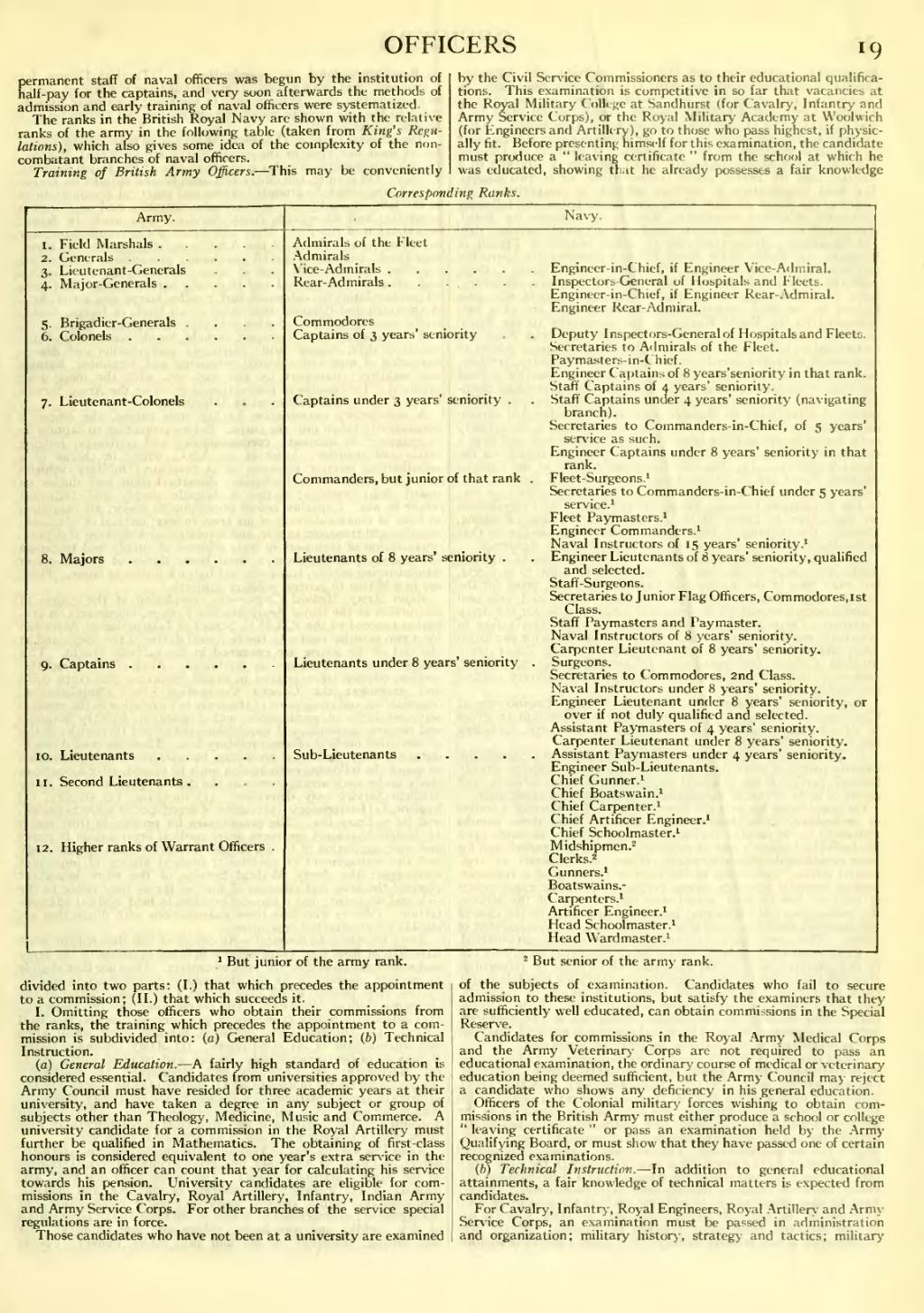permanent staff of naval officers was begun by the institution of half-pay for the captains, and very soon afterwards the methods of admission and early training of naval officers were systematized.
The ranks in the British Royal Navy arc shown with the relative ranks of the army in the following table (taken from King’s Regulations), which also gives some idea of the complexity of the non-combatant branches of naval officers.
| A table should appear at this position in the text. See Help:Table for formatting instructions. |
Corresponding Ranks.
| Army. | Navy. | |
| 1. Field Marshals | Admirals of the Fleet | |
| 2. Generals | Admirals | |
| 3. Lieutenant-Generals | Vice-Admirals | Engineer-in-Chief, if Engineer Vice-Admiral. |
| 4. Major-Generals | Rear-Admirals | Inspectors-General of Hospitals and Fleets. Engineer-in-Chief, if Engineer Rear-Admiral. Engineer Rear-Admiral. |
| 5. Brigadier-Generals | Commodores | |
6. Colonels
7. Lieutenant-Colonels
8. Majors
Captains of 3 years’ seniority
Captains under 3 years’ seniority
Commanders, but junior of that rank
Lieutenants of 8 years' seniority .
9. Captains
10. Lieutenants ....
11 . Second Lieutenants .
12. Higher ranks of Warrant Officers
Lieutenants under 8 years' seniority
Sub-Lieutenants
Deputy Inspectors-General of Hospitals and Fleets.
Secretaries to Admirals of the Fleet.
Paymasters-in-Chief.
Engineer Captains of 8 years'seniority in that rank.
Staff Captains of 4 years' seniority.
Staff Captains under 4 years' seniority (navigating
branch). Secretaries to Commanders-in-Chief, of 5 years
service as such. Engineer Captains under 8 years' seniority in that
rank. Fleet-Surgeons. Secretaries to Commanders-in-Chief under 5 years
service. Fleet Paymasters. Engineer Commanders. Naval Instructors of 15 years' seniority. Engineer Lieutenants of 8 years' seniority, qualified
and selected. Staff-Surgeons. Secretaries to Junior Flag Officers, Commodores, 1st
Class. Staff Paymasters and Paymaster. Naval Instructors of 8 years' seniority. Carpenter Lieutenant of 8 years' seniority. Surgeons.
Secretaries to Commodores, 2nd Class. Naval Instructors under 8 years' seniority. Engineer Lieutenant under 8 years' seniority, or
over if not duly qualified and selected. Assistant Paymasters of 4 years' seniority. Carpenter Lieutenant under 8 years' seniority. Assistant Paymasters under 4 years' seniority. Engineer Sub-Lieutenants. Chief Gunner. Chief Boatswain. Chief Carpenter. Chief Artificer Engineer. Chief Schoolmaster. Midshipmen. Clerks.2 Gunners. Boatswains. Carpenters. Artificer Engineer. Head Schoolmaster. Head Wardmaster.
1But junior of the army rank. 2But senior of the army rank.
Training of British Army Officers.—This may be conveniently divided into two parts: (I.) that which precedes the appointment to a commission; (II.) that which succeeds it.
I. Omitting those officers who obtain their commissions from the ranks, the training which precedes the appointment to a commission is subdivided into: (a) General Education; (b) Technical Instruction.
(a) General Education.—A fairly high standard of education is considered essential. Candidates from universities approved by the Army Council must have resided for three academic years at their university, and have taken a degree in any subject or group of subjects other than Theology, Medicine, Music and Commerce. A university candidate for a commission in the Royal Artillery must further be qualified in Mathematics. The obtaining of first-class honours is considered equivalent to one year's extra service in the army, and an officer can count that year for calculating his service towards his pension. University candidates are eligible for commissions in the Cavalry, Royal Artillery, Infantry, Indian Army and Army Service Corps. For other branches of the service special regulations are in force.
Those candidates who have not been at a university are examined by the Civil Service Commissioners as to their educational qualifications. This examination is competitive in so far that vacancies at the Royal Military College at Sandhurst (for Cavalry, Infantry and Army Service Corps), or the Royal Military Academy at Woolwich (for Engineers and Artillery), go to those who pass highest, if physically fit. Before presenting himself for this examination, the candidate must produce a “leaving certificate” from the school at which he was educated, showing that he already possesses a fair knowledge of the subjects of examination. Candidates who fail to secure admission to these institutions, but satisfy the examiners that they are sufficiently well educated, can obtain commissions in the Special Reserve.
Candidates for commissions in the Royal Army Medical Corps and the Army Veterinary- Corps are not required to pass an educational examination, the ordinary course of medical or veterinary education being deemed sufficient, but the Army Council may reject a candidate who shows any deficiency in his general education.
Officers of the Colonial military forces wishing to obtain commissions in the British Army must either produce a school or college “leaving certificate” or pass an examination held by the Army Qualifying Board, or must show that they have passed one of certain recognized examinations.
(b) Technical Instruction.—In addition to general educational attainments, a fair knowledge of technical matters is expected from candidates.
For Cavalry, Infantry, Royal Engineers, Royal Artillery, - and Army-Service Corps, an examination must be passed in administration and organization; military history, strategy' and tactics; military
